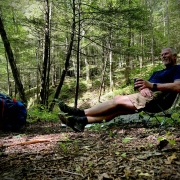How to Escape the Rat Race | Healthy Aging Series: S8, E5
This blog will examine the work, “The Country Chronical,” by Gladys Tabor
I love sleeping in a tent, especially when it’s raining. I’ve had a few unpleasant experiences camping. Mostly I love it. I’ve slept through a blizzard in the Sierra mountains. Woke up to a foot of snow. I’ve slept through a “no see him“ infestation in Utah. I think mosquitoes are worse. And I’ve slept through a 14° night on the Knobstone trail in Indiana. I had to thaw my boots to put them on the next morning. Backpacking has always help me escape the rat race as you get older. Don’t you just crave peace and quiet?
Isn’t it nice to get away from people, and your computer, and traffic. That’s a big one for me. Getting away from your job, and people, and the news, and have I mentioned people? Backpacking is one way I get away from all that. Hiking is another. Sitting in my easy chair with a good book is yet another. I’m escaping now as I write this blog.
My male kitty, Hansel, is stretched out on the floor in front of our gas fireplace. I can hear him purring from several feet away. He looks up periodically and then jumps up on the arm of my chair and kisses my nose. I love his nose kisses! All of this calms my nervous system.
I think I learned how to escape from my mother. A recent study that I read on aging suggests that as men age they are influenced more by their fathers and then by their mothers. Maybe. But I feel my mother’s legacy even now, as I slowly approach 70.
You might not believe what I’m about to tell you, but she introduced me to some books by an author, Gladys Tabor, when I was a teenager, and I read them, and I loved them! I asked for them before she died, and I cherish those early memories of reading them. I guess they helped me escape the rat race of adolescence, even just a little. Gladys Tabor left city life in 1935 and moved into a vintage 1690 farmhouse she called Stillmeadow. I think my mother moved out of the city when I was 14, in part, because of Stillmeadow.
Through my four years of high school, we lived on a 20 acre farm. She named Terre Boon, which means the good land. I’m sure she thought it was going to be harder for me to get into trouble when we lived on a farm. Not impossible but harder. I reread “Country Chronicles,“ this past evening. It’s a journal of Taber’s first full year at Stillmeadow. It was written in 1974 when she was 85 years old. Country Chronicles is written in four parts, based on the four seasons, starting with winter. I really can’t tell you what the appeal was when I was a teenager and first read these journals. They are the insights of an older woman and her life with her good friend, her children and her cocker spaniels. She writes about her meals, her neighbors, the snow, her house, the fresh smells of the country and the chores around Stillmeadow.
I randomly opened Country Chronicles to page 62 and here’s what Tabor wrote:
“On a clear day, toward the end of winter, the sky is forever. It loses the flat look of a bitter cold days, and seems to have a special promise. Even the birds fly differently, in widening circles instead of huddling. The air smells of melt instead of ice, and the buds on the lilacs are freshly varnished.”
Gladys Taber loved country life and shares tidbits of her “philosophy of life” throughout her books. Many of them were written during the Vietnam war and have an activist feel to them at times.
Here are some of the things that drove her to leave the rat race, and pursue country living:
- She writes a lot about the Vietnam war, and the effect that it had on relationships. I think her comments are somewhat appropriate in this very polarize time that we live in today. She writes, “The Vietnam war has been blamed for many things, and I suspect it had something to do with personal isolation, therefore, we now tend to keep conversations superficial in case that other person does not agree with our policy. We keep our cool, as we say, by talking about the weather.” I find myself in today’s rat race withdrawing and keeping my topics on small talk.
2. Tabor worried about the loss of farmland and about progress. She wonders, “what the next hundred years will bring is not predictable. But I hope the basic personality of our town may survive with some woodlands and meadows left, some streams, still rippling with trout, some winding country roads unpaved.“ I think this is still relevant today.
3. Clocks. Tabor hated clocks. “Within our society,” she writes, “we all watch the clock, nevertheless. They are clocks in almost every room in the house, and practically everyone wears a wrist watch. Radio and television announce the time hour after hour, to be sure, we know exactly what time it is.” Part of the rat race is being at the mercy of the moment, and at the mercy of time, and at the mercy of schedules. Maybe unplugging means leaving your wrist watch and your smart phone at your bedside for a day or two.
4. Tabor loved her pets! She writes: “I stand firmly on my belief that both dogs and cats give richness to life, and both have been invaluable to humankind down through the ages.” Pets were a large part of her life, and I’m sure helped her have a sense of getting away from the rat race.
5. For Taber, happiness was a choice. “I believe happiness,” she writes, “is simply reaching out for something lovely and believing in it. All of us need some magic in our lives, and all we have to do is believe in it.” Later she writes, “It may be that happiness is as simple as accepting what we are, and never envying those who seem to be endowed with other gifts.”
I think that part of the rat race that we create for ourselves, is the competition that we create for ourselves with other people. Tabor reminds us that life is not a competition and maybe it’s as simple as appreciating the magic that is around us.
6. Being grateful. By the time she wrote this book, she had lost her husband, but instead of feeling pity, she practiced gratitude. “I think,” she explains, “when we find so much to complain about, we should spend a little time, adding up what we have, and being grateful. I myself never open a box of tissues, without being thankful. I am not boiling up squares of linen.” I am not sure what, “boiling up squares of linen,” means, but it must not be one of her preferred activities.
7. Tabor had a rather old fashioned idea of parenting. Maybe this is why my mother was drawn to her. She believed that mothers should stay home and take care of their children. I think in today’s world, the application of Taber’s old fashionness should be interpreted as: parents spend as much time as you can with your children. The rat race acts as a siren, pulling us away from our partners and our children. We should realize that those wonderful moments with family are in fact, a way of escaping the rat race, which soothe our sakes.
I think we can safely say that Stillmeadow rescued Gladys Tabor from the rat race. Maybe Stillmeadow can rescue you as well even though her books are difficult to find because they are out of print.
Or maybe you can escape by taking a walk or hike in the Jefferson Memorial Forest, or The Parklands. May be reading sci-fi is a way for you to escape. Or adventure novels.
Or maybe, just maybe, it’s time to move to the country.
To see more entries in the Healthy Aging series, click here.













